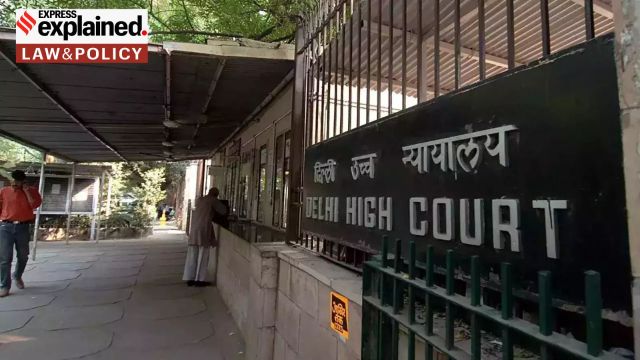Why Delhi HC allowed 60-year-old couple to access dead son’s sperm
The parents of the 30-year-old man who died of cancer in 2020 had moved the Delhi High Court after a hospital, which had cryopreserved their son’s frozen semen sample, refused to release it
 “In the absence of a spouse, the question arises: is there any prohibition on posthumous reproduction under the existing law? The answer is clearly in the negative. In the absence of any such prohibition, this Court is unable to read a restriction where none exists,” the Court said. (File Photo)
“In the absence of a spouse, the question arises: is there any prohibition on posthumous reproduction under the existing law? The answer is clearly in the negative. In the absence of any such prohibition, this Court is unable to read a restriction where none exists,” the Court said. (File Photo)The Delhi High Court last week allowed a couple in their sixties to gain access to their now deceased son’s sperm sample, effectively paving the way for posthumous assisted reproduction.
Here is what you need to know about the ruling, and the questions it raises.
The case
The parents of the 30-year-old man who died of cancer in 2020 had moved the Delhi High Court after a hospital, which had cryopreserved their son’s frozen semen sample, refused to release it.
Sperm banking is common among cancer patients since cancer treatments such as radiation and chemotherapy can affect sperm count and quality. The hospital, when refusing to release the preserved sperm to the parents, reasoned that there are no guidelines to navigate release of gametes in a scenario where there is no spouse. Thus it took the position that the sperm could not be released without appropriate court orders.
This led to the petitioners, with a “wish to carry on the legacy of their deceased son” and raise a grandchild, seeking the court’s intervention. They told the court that they, along with their daughters, were “prepared to take full responsibility for any child born via surrogacy using the frozen semen sample”.
The law
The Assisted Reproductive Technology Act, 2021 deals with regulation and supervision of all fertility and artificial insemination procedures. The accompanying Assisted Reproductive Technology Rules, 2022 prescribes the procedure for “posthumous retrieval of sperm”, but only accounts for scenarios where the deceased is married, and the person seeking retrieval is the surviving partner.
The Ministry of Health and Family Welfare (MoHFW), in an affidavit filed before the Court in this case, argued that the legislation was not intended to apply in cases referred to by the Court as “postmortem grandparenthood”. It said that the Surrogacy Regulation Act applies only to intending couples or women with medical needs for surrogacy, and does not cover grandparents as “intending grandparents”.
International practices
With limited Indian jurisprudence on the matter, the petitioners relied on evolving jurisprudence from abroad. Several jurisdictions around the world permit for posthumous reproduction, but with explicit consent.
Uruguay allows posthumous reproduction with written consent, which is valid for a year. Belgium permits it after a six-month waiting period following the death, but the request must also be made within two years.
The state of Victoria, Australia permits posthumous reproduction after written or oral consent in presence of two witnesses, and following approval from a “patient review panel”. It also mandates counselling for the parent.
Canada and the UK both require written consent for posthumous reproduction. Israel meanwhile excludes parents, permitting only the deceased’s female partner to use the sperm sample, although exceptions have been made in this regard.
The Delhi HC ruling specifically referred to a case in Israel, where the parents of a 19-year-old soldier killed in combat obtained legal permission to use their son’s sperm posthumously. A daughter was born from the deceased son’s sperm.
The ruling
First, the Court agreed with the petitioners that the ART Act and its rules cannot apply in their case, as the legislation had not come into force at the time of their son’s death. This meant that there was no prohibition on the release of the gamete to a person other than the spouse.
Second, the Court also accepted the petitioners’ argument that gametes or semen samples can be treated as “property” since it is part of the individual’s biological material just like “the human corpse or its organs”.
On whether the parents of the deceased are entitled to the release of the sample, the Court relied on the Hindu Succession Act, where parents are considered as Class-1 legal heirs of a deceased in the absence of a spouse or children.
“In the absence of a spouse, the question arises: is there any prohibition on posthumous reproduction under the existing law? The answer is clearly in the negative. In the absence of any such prohibition, this Court is unable to read a restriction where none exists,” the Court said.
Precedent and concerns
The Court’s ruling sets a precedent that a claim can be made by a party to the Court, other than the spouse, for retrieving frozen eggs, sperm of a deceased individual.
However, the HC ruling also cautions that such a transfer of possession “cannot be automatic” given that “informed consent and the welfare of the future child in cases of posthumous reproduction or post-mortal reproduction” is to be borne in mind. “Each case needs to be judged on its own facts, without a general rule,” the Court said.
This is crucial since posthumous reproduction raises several ethical questions for the legislation to consider, from the assumption of consent by the deceased, to the fact that the child born will grow up in the absence of even one genetic parent.
Even if not raised in this case, such a claim presents a complexity of issues involving the family structure. While posthumous grandparenthood seems to challenge the notions of a traditional family structure, the desire in most cases would stem from patriarchal values which advocate preference for continuing patrilineal lineage.





- 01
- 02
- 03
- 04
- 05

































